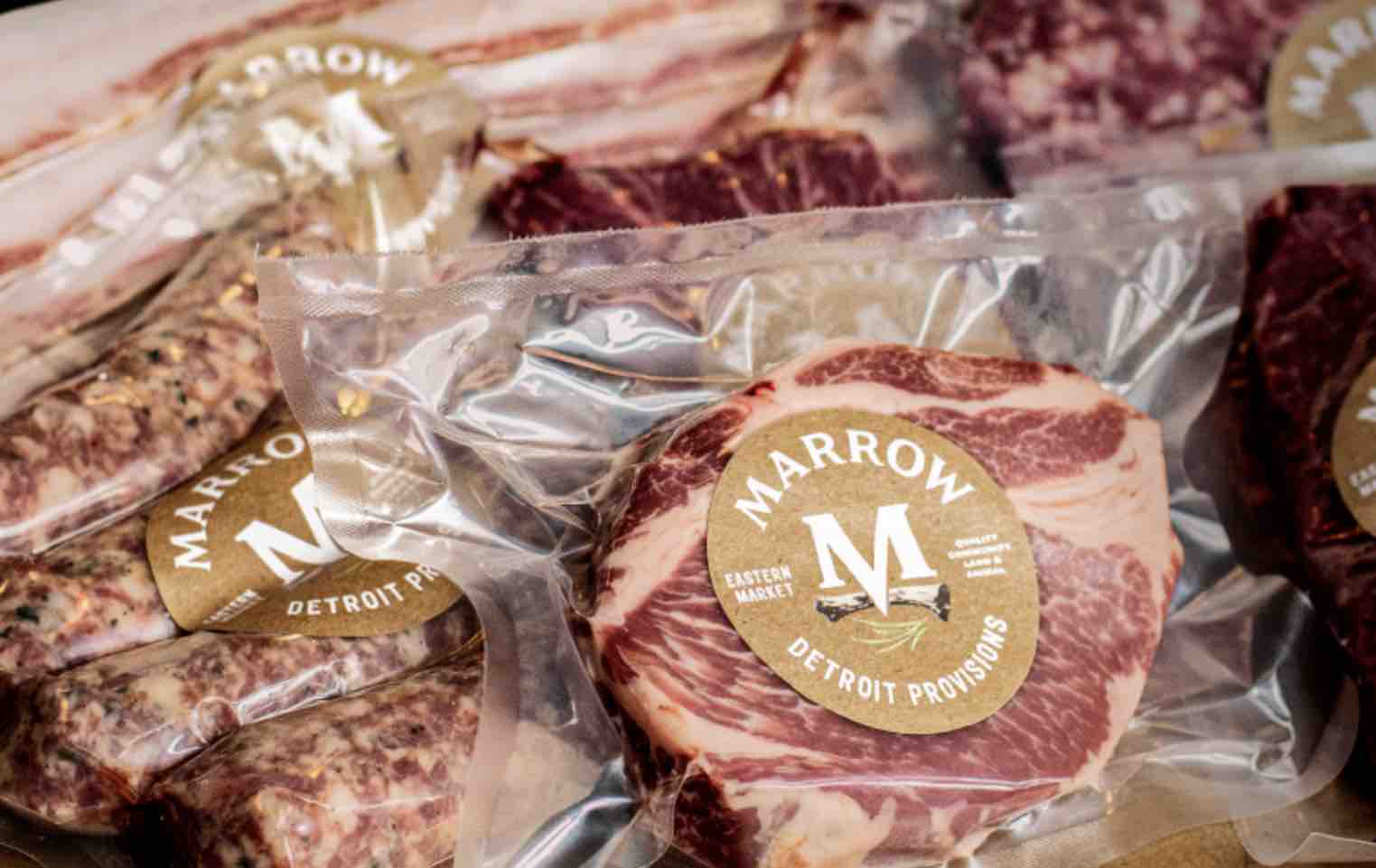Due to the decades of industrialized meat production and its impact on the environment, the meat industry tends to get a bad rap these days. But Marrow Restaurant and Butcher Shop has taken dramatic steps to reduce that trend and return to a better, more sustainable path, back to one that values freshness, local communities, animals, and the earth.
In 2018, Ping Ho, founder of Marrow, had a vision to return to an ethical and sustainable approach to meat. By developing a short food supply chain that partnered with local farmers in the Great Lakes region who were invested in good farming practices that respect both their animals and their land, Marrow has created a hyper-local system to produce high-quality meats that are kind to the environment and valued by the local community.
All of Marrow’s products come from small-scale farmers within 200 miles of their butcher shop. Marrow’s butchers are well-versed in the stories of their farmers, the best cuts of meat, and the best ways to use it. Marrow has made it possible for people to enjoy these products in a number of different forms: guests can purchase meat from the butcher shop, order meat through a monthly subscription service, participate in classes, buy and take home prepared meals, or eat in the local restaurant.
Each of these pathways ensures a greater engagement with the local community of farmers, producers, and consumers, a finer product, and a better future for our planet.
Sustainable Farm-to-Butcher-to-Table Supply Chain
“As we continue to develop our society, there’s a need to really go back to our food source and go back to finding better ways to eat, and supporting small farmers is one way to do it,” Ping Ho said in an Eventbrite video series, “Heart of Gathering.”
As more and more farmers hit the retirement age, there are also fewer younger U.S. farmers coming up to fill in the gaps. This means more and more meat will have to be produced and shipped into the U.S. from other countries.
But if consumers value locally and ethically produced food, then it will keep more of these passionate and committed small-scale farmers in business.
“Buying and eating local, where possible, is one small but important step towards supporting the economic viability of your immediate community; the livelihoods of farmers in your region and everyone who works on getting good, fresh food onto the table,” writes Ping Ho on Planted Detroit’s blog.
Ho understands that the quality of the meat they serve in their butcher shop and restaurant begins long before it reaches their butcher block.
“It all begins with the soil, to what they feed the animals, to how they graze the animals so that the ecology of the land is not disturbed,” said Ho.
Marrow takes this commitment to the local farmer at more than their word; they form in-person partnerships with local farmers, visiting their farms, building relationships with the people caring for the animals, and getting to know their processes so they can tell the stories of these farmers and their animals. They want to close the gap between producers, consumers, and communities so that all three are connected in meaningful ways.
“I’m the connecting point from the farmer to the customer,” said Nicholas Ponte, a butcher with Marrow. “Their values should align with ours and how we feed the community.”
Marrow Butcher Shop and Marrow Detroit Provisions
Marrow’s popularity has grown since its founding in 2018. To accommodate their growth, Marrow expanded its meat operations into a standalone entity called Marrow Detroit Provisions (MDP). The development of this separate entity allows MDP to maintain its commitment to developing a “short supply chain.”
“It starts with the direct relationships we build with our farmers that go beyond a simple purchase transaction,” writes Set Duivenvooden, VP of Operations at Marrow, on Marrow’s blog. “We only partner with farms that are proud to show us their operations and how they care for their animals’ well-being. These farms have focused on meat quality, ingenuity, and relationships with their communities for generations. They are mindful about what they feed their animals, procuring feed from their neighboring farms or the by-products from local food businesses.”
Marrow has two butcher shops that stock different cuts of fresh meat every single day—the West Village Butcher Shop and the Eastern Market. Their shops feature recipe-driven sausages, smoked meats, and other premium products. A permanent home for Marrow Detroit Provisions in the Eastern Market will open in 2024. Their building will house a state-of-the-art meat processing facility in addition to a new restaurant and rooftop bar, run by Marrow.
To encourage more support of local farmers, Marrow sells Provisions Packs, which are essentially a fresh meat subscription service. Each month, Marrow’s butchers hand-select cuts of steak, house-made sausages, bacon and more that have been locally sourced from trusted farmers. Provisions Packs are available for pickup each month at the West Village butcher shop.
Marrow Restaurant: A Hyper-Local Dining Experience
Marrow is a four-time James Beard-nominated restaurant powered by Executive Chef Sarah Welch. Welch is a Top Chef Season 19 finalist who fully embraces the local and ethically sourced mantra of Marrow. The restaurant showcases the superior flavors, textures, and tastes that are the result of this commitment.
Open Thursday through Sunday for lunch and for dinner, Marrow takes an unusual approach to the dine-in experience. Lunch is casual and available at the butcher shop’s 10-seater bar. The menu varies, and no reservations are required. For dinner, Marrow offers an a la carte menu as well as a five-course chef’s tasting dinner. The tasting menu changes daily and features signature dishes that aren’t available on the a la carte menu.
Marrow’s restaurant also partners with Table 22 to offer the Marrow Meal Club so that you can enjoy Marrow at home. This monthly subscription includes ready-to-cook meals for dinner, lunch or both.
Educating the Community Leads to a More Sustainable Community
As fewer consumers have direct contact with the farms and farmers who raise and harvest their food, education is increasingly important so that people understand where their food comes from and why sustainable practices are so critical for our future.
People love to eat and eat well. We value quality food as a society. But without sustainability and ethical land and animal management practices, our ability to “eat, drink, and be merry” will be diminished.
Classes hosted by Marrow’s chefs and butchers give people the hands-on experience of processing meat, which deepens their knowledge and appreciation for the art, sacrifice, and treatment of the animals that they’re consuming.
“The classes we do teach people how to break things down,” said Ho. “Don’t be afraid. It’s a craft. If you want to eat well you have to learn how to process an animal.”
Taught by Marrow’s chefs and butchers, the workshops vary from how to break down meat to how to make sausage. For the holidays, the team hosted a Holiday Charcuterie Building with Chef Sarah Welch.
This collaboration is just one more effort to close the gap between consumers and producers and build a more sustainable community.
“The most meaningful part of Marrow is seeing the community enjoy themselves,” said Ho.
“Our belief is that meat should and will continue to be a mainstay in the American diet for cultural, nutritional and epicurean reasons, and that a ‘good meat industry’ powered by small, independent farmers who practice responsible and regenerative farming, can and must be developed,” writes Ho. “The challenge for those of us in the business is to produce meat in a way that adds net positive value to our environment and society while retaining flavor and quality at an accessible price point.”





 Copyright
2024
Root and Vine
Copyright
2024
Root and Vine